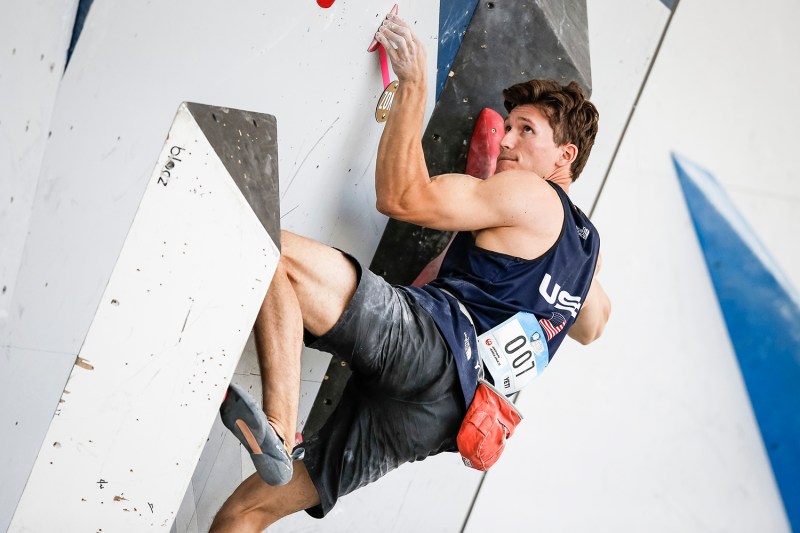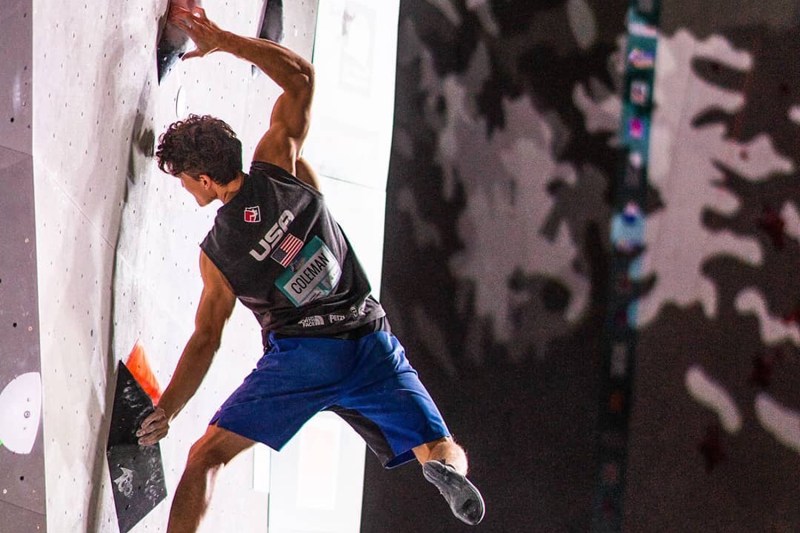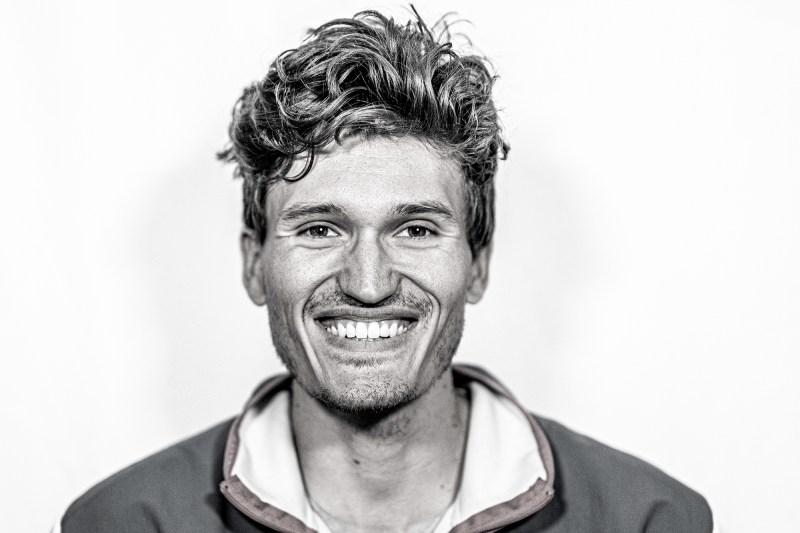
When Nathaniel Coleman faces the rock, everything else disappears. There are no competitors. No judges. No medals or fans or the friends and family back home. “Everything external doesn’t matter,” the 24-year-old tells The Manual. “All I can focus on is the route before me.”
In 2019, the route ran through the IFSC Combined Qualifier in Toulouse, France, where a strong result in the bouldering discipline earned him a spot in the 2020 Olympic Games. It was his only goal for that year, and he battled burnout and injury to guarantee his place at the inaugural contest of sport climbing in the Olympics. He was the first American man to secure a berth, and with a field capped at 20 athletes total from around the world, no country is guaranteed a representative.
Related Guides
But with the Olympics’ delay, he’s spent the better part of the last two years away from the goal that once drove him so acutely. In 2020, he completed the first ascent of V16 bouldering problem “The Grand Illusion” in his home state of Utah, a series of moves so difficult that they require the grip strength of a gecko. Coleman rested, healed, reset. And now, with the Olympics right around the corner, he’s refocused.
“The goal is much different now,” he says. “I’ve achieved what I’d been working for, and now, it’s like, there’s no failure at this point.”
Speaking with Coleman, it’s hard to get a bead on him. The raw competitive drive and inflated ego that distinguishes other professional athletes is wholly absent in him; he comes off measured and precise, more strategist than athlete, and indeed, over the last year he says he’s rediscovered a childhood love of chess thanks to the Netflix show The Queen’s Gambit. His reputation and comportment mirror what his peers and competitors say when they square off: No one handles pressure better.

“Being cool under pressure doesn’t happen when the pressure builds,” he says. “It happens in the calm, before you walk out to climb. You need to center yourself and give yourself a base to start from and then to come back to.”
If Coleman feels pressure to make his mark at the Tokyo Games, he doesn’t betray it. He admits that while the Olympics would be on the TV when he was a child, and Michael Phelps is a name he remembers, that’s as far as his knowledge extends. He’s more interested in skateboarding, mixed marital arts, and the YouTube channel ChessBrah, which is exactly what it sounds like. “It seemed what I did was too different,” Coleman says of climbing’s future within the pageantry of the Olympics. Furthermore, “I never expected to be capable of making the Olympics if it did come around.”
This last bit is a curious statement, because Coleman has been at the top of his sport domestically for almost a decade. After starting to climb at age nine, he says his only goal was to do well nationally, which was both the height and the sum of his knowledge of the sport. “I didn’t even know there was international competition at the time,” he says. With blinders toward his goal, he focused and fulfilled, winning the U.S. national bouldering title every year from 2015 to 2020, save for 2019, when he was runner-up.
But it was in international competition that his boundaries expanded. At 17, he traveled to Vail, Colo., which was hosting an IFSC World Cup stop. “It was like the next level was right there,” he says. “It became my main focus, to try to do better at the next international competition.”

On that international stage, most men specialize in one of three disciplines: Bouldering, which is short and punchy; speed, which is tall but less technical; and lead, which combines the two. Coleman has always been a bouldering specialist, though he’s picked up the other disciplines along the way. At the Olympics, the contest format combines all three, a Frankenstein climbing triathlon, and so far this year, at the World Cups he’s experienced mixed results when mixing disciplines: A fifth and sixth in bouldering in Austria and Switzerland, respectively, seemed positive, but lower, mid-pack results in lead and speed were less than expected. “It’s been harder lately,” he admits, “but I have coaches and a lot of teammates that support me, so we’re still training.”
While he relished the COVID-enforced time away from the indoor climbing scene, he is back with a full tank of gas. “Getting back into the training and the international competition has almost been more exciting than any year in the past because I went so long without it,” he says.
For some sports, the Olympics have always been the pinnacle, its highest exhibition and brightest moment in the sun. Coleman, for his part, isn’t ignorant of the million-watt spotlight shining on his subculture sport. His sponsors have swelled from endemic outfitters like The North Face and SCARPA to newcomers like Rise Brewing Co. and its oat milk. He predicts a flood of newcomers into climbing gyms around the U.S., especially for his specialty of bouldering. Bouldering “[is] a great segue into lead climbing,” he says, which feeds into speed climbing, each building the sport and pushing toward greater levels than even he can imagine.
But rather than the Olympics being the pinnacle of his sport, they’re an extension — or possibly a diversion — from what has previously been an unrelated sport. And as such, as he prepares to depart for Tokyo on July 21, he’s set his sights on a new goal.
Until recently, he told friends and family that he was going to make the top eight, which would boost him into the final round, where it was any man’s medal to win. And he still thinks of it: “The final round would be an incredible experience,” he says.

But on the advice of his parents, he’s refocused on a different goal: To just enjoy the experience.
On the day of this writing, the spike of COVID cases in Japan has necessitated the canceling of all spectators from events. For some, it’s heartbreaking. But, for Coleman? We’re not sure. The audience, even if they were there, would fade; his competitors blur into the periphery; and an Olympic medal of gold, silver, or bronze remains, as for most, illusory, a dream, a mirage.
All that lies in front of him is the first hold, and the next, and the next, and the next.
“Every competition is a dice-roll, and if I have a good day, I could make finals,” Coleman says, “but there’s a really good chance that I don’t.”
Are there goals that he doesn’t share? That he doesn’t speak into existence? Visions that he sees in the small hours of the night, alone in bed, with Japan far away?
“Sometimes,” he says. “If I don’t share them, it’s because I haven’t acknowledged them.”
Postscript: At the Tokyo Games, Coleman kept a governor on his performance in the qualification round, notching results at fifth and sixth overall through the three disciplines and squeaking into the final in the eighth and final spot. But there, the months of mental preparation paid off.
Finishing sixth in the finals of speed climbing (and falling to 17-year-old American wunderkind Colin Duffy, no less), and in his specialty of bouldering, he led the field, notching the top spot and earning the distinction as the only climber to finish two of the three problems. A fifth-place finish in lead earned him the silver medal.
“During the medal ceremony, Coleman shook his head seemingly in disbelief, put his hands together in gratitude and examined both sides of the medal before putting it around his neck,” USA Climbing said in its release.
To those that know him best, an Olympic medal is something that he may not have considered. But as someone who keeps his dreams to himself, even we’re not completely sure.



